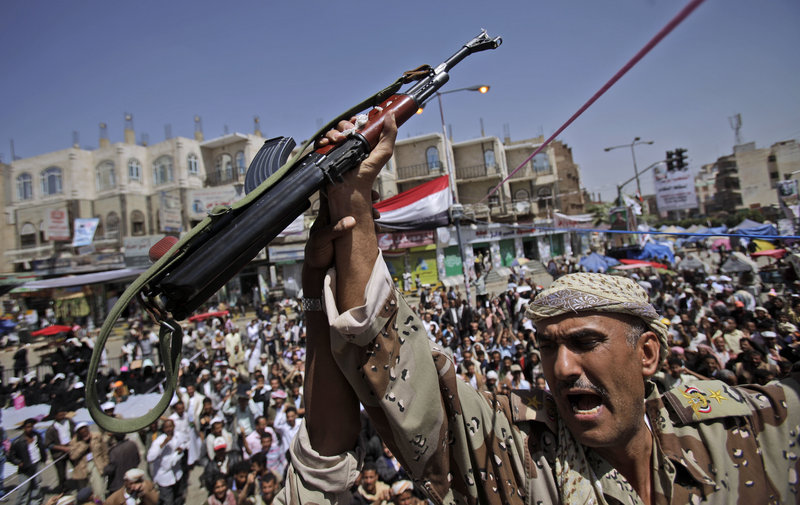SANAA, Yemen — A top military commander and at least 18 other senior officers defected Monday to the opposition movement demanding the ouster of Yemen’s embattled president, depriving the U.S.-allied ruler of most of his power base.
The looming collapse of President Ali Abdullah Saleh’s regime throws into doubt the American campaign against a major al-Qaida wing that plotted attacks in the United States.
Monday’s defections led to rival tanks being deployed in the streets of Yemen’s capital, Sanaa, prompting Saleh’s defense minister, Mohammed Nasser Ahmed, to announce the military remained loyal to the longtime leader.
The armed forces will counter any plots against the government, Ahmed declared on state television after a meeting of the National Defense Council, which is led by Saleh and includes Ahmed, the prime minister and the intelligence chief.
The defection of Maj. Gen. Ali Mohsen al-Ahmar, a longtime Saleh confidante and commander of the army’s powerful 1st Armored Division, was seen by many as a turning point. It followed a major escalation in the regime’s crackdown on demonstrators, when more than 40 people were killed in bloody clashes Friday.
Tanks, armored vehicles and soldiers directed by al-Ahmar fanned out around the Sanaa square that has become the epicenter of the opposition movement, moving in for the first time to protect demonstrators.
Al-Ahmar also sent tanks to the state television building, the Central Bank and the Defense Ministry. Just miles away, at least a dozen tanks and armored personnel carriers belonging to the Republican Guards, an elite force led by Saleh’s son and one-time heir apparent, Ahmed, were deployed outside the presidential palace.
The deployment of al-Ahmar’s troops in Sanaa was greeted by wild jubilation from protesters, many of whom posed with soldiers for photographs, greeted them with military style salutes or offered them roses.
Calling Al-Ahmar’s defection “a turning point,” Edmund J. Hull, U.S. ambassador to Yemen from 2001 to 2004, said it showed “the military overall … no longer ties its fate to that of the president.”
“I’d say he’s going sooner rather than later,” Hull said.
In a sign of the Obama administration’s growing alarm over the regime’s crackdown on demonstrators, State Department spokesman Mark Toner called on the Yemeni leader to refrain from violence.
“We abhor the violence. We want a cessation of all violence against demonstrators,” Toner said, calling on Saleh to “take the necessary steps to promote a meaningful dialogue that addresses the concerns of his people.”
The 65-year-old president and his government have faced down many serious challenges in the past, often forging fragile alliances with restive tribes to extend power beyond the capital. Most recently, he has battled a seven-year armed rebellion in the north, a secessionist movement in the south and an al-Qaida offshoot that is of great concern to the United States.
Al-Qaida in the Arabian Peninsula, formed in 2009, has moved beyond regional aims and attacked the West, including sending a suicide bomber who tried to down a Detroit-bound airliner on Christmas Day with a bomb sewn into his underwear. The device failed to detonate properly.
Yemen is also home to U.S.-born radical cleric Anwar al-Awlaki, who is believed to have offered inspiration to those attacking the United States, including Army Maj. Nidal Hasan, who is accused of killing 13 people and wounding dozens in a 2009 shootout at Fort Hood, Texas.
Saleh has been a key, though not entirely reliable, U.S. ally in the fight against al-Qaida, frustrating his Washington backers with the delicate balancing act he has undertaken to maintain the goodwill of powerful tribes providing refuge to operatives from the terror network.
He has also earned a reputation for milking the “al-Qaida card,” demanding millions of dollars in military aid that he has used to bolster the capabilities of units loyal to him rather than take on al-Qaida.
A Saleh successor would not be much different, because Yemen’s complex tribal system would stay intact after he is gone.
Al-Ahmar and two other senior army officers who defected Monday belong to Saleh’s Hashid tribe and a tribal leader said it was rallying behind al-Ahmar as a possible replacement for Saleh, eager to keep the president’s job for one of its own.
A key Hashid leader, Sadeq al-Ahmar, said he and his supporters were also joining the protest movement. Speaking to Al-Jazeera television, he said the death of scores of protesters Friday made him decide to back the opposition after weeks of trying to mediate between Saleh and the protesters.
Send questions/comments to the editors.



Success. Please wait for the page to reload. If the page does not reload within 5 seconds, please refresh the page.
Enter your email and password to access comments.
Hi, to comment on stories you must . This profile is in addition to your subscription and website login.
Already have a commenting profile? .
Invalid username/password.
Please check your email to confirm and complete your registration.
Only subscribers are eligible to post comments. Please subscribe or login first for digital access. Here’s why.
Use the form below to reset your password. When you've submitted your account email, we will send an email with a reset code.